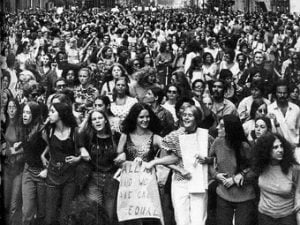Recent Eras: Progress and Backlash in Feminism-Lois Banner

Women banded together in organizations like the National Organization for Women (NOW) to successfully demand the end to discrimination in education, employment, the professions, and areas like rape laws, sex harassment, birth control, and abortion. Laws were passed at the federal, state, and local level, and women’s commissions were established to suggest needed changes and oversee enforcement.
Concurrently, backlash appeared. Identifying all feminists with small radical fringe groups, the media successfully labeled feminists as man-hating lesbians who wanted to destroy the home and the family. The charge was deeply inaccurate, although it seemed to dominate the national conversation about the women’s movement.
In reality, the feminist movement included a broad coalition of groups who advocated a variety of goals, including wages for housework, child-care centers for working mothers, and a variety of laws (typical of all European democracies), supporting maternity and paternity leaves during childbirth and aid to poor mothers raising children. Self-help medical clinics were established; sexual freedom was advocated; and rape crisis centers and spousal abuse refuges were set up. Feminists of the 1970s have often been accused of being anti-sex, which is another inaccurate charge. Many feminists were married and raising children. Women in the labor movement were major supporters of rights for working women, while Black women and Chicano women joined the general organizations and formed their own separate branches.
The success of the movement is evident in the high ratios of women in higher education and in the professions, in equal pay for equal work laws, in the numbers of women in politics, and in the success of women in highly visible areas like sports and broadcast journalism.
In fact, concerns have recently been raised about the ability of men to deal with the new situation of gender equality, while women worry about the need to put off marriage and childrearing while undertaking careers. At the same time they wonder if men, in the present “hook up” culture of free sexuality, will ever marry. These are issues very relevant to women in their 20s and 30s.
It now appears that gays will achieve the right to marry, attaining their most important goal, and legitimating their status in general as practicing a valid sexual orientation. Yet attacks on women’s right to their own bodies continue to escalate. With women now admitted to the military, rape has become a major issue throughout the armed services. (Men constitute a percentage of the victims.) Many states have severely limited access to abortion, and it is now a possibility that the Supreme Court may overturn Roe v. Wade. Sexual trafficking of women and children across international borders and within the United States has become a huge issue. The radical right’s attack on women is especially directed against poor women, who are held responsible for their poverty, even when they can’t find employment or the jobs they find pay starvation wages.
Lives can be dedicated to self-indulgence or to helping others. Individuals can spend their time in endless consumption, or in finding social solutions. Throughout American history, in times of crisis movements have appeared intent on creating meaningful change. Community organizations are being formed throughout the nation; individuals are addressing significant issues like global warming and overpopulation. Feminists, standing for equality and a just society, are involved in all these efforts, in a broad-scale attempt to bring a productive future to the United States and to the world.





